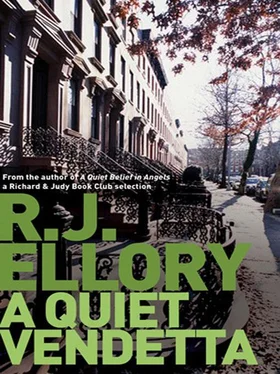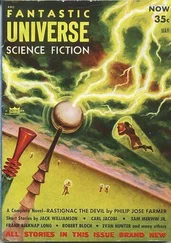Hartmann was struck dumb.
I’ll tell Jess goodnight for you, okay ?
‘Carol-’
I’m taking her to bed, Ray… I don’t have anything else to say .
The line went dead and Hartmann sat there with the cellphone pressed against his ear for some seconds. There were tears in his eyes, a fist of emotion in his throat, and when he turned and handed the phone back to Verlaine he said nothing.
‘It’s gonna be okay,’ Verlaine said. ‘Hell, she let you talk to your kid, right?’
Hartmann nodded. He wiped his eyes with the ball of his thumb. He reached for the lever and opened the door.
‘Thanks John,’ he said as he started to climb out of the car.
‘Hey,’ Verlaine called after him.
Hartmann looked back over his shoulder.
‘You’re gonna come out of this fine,’ Verlaine said. ‘Believe me, I’ve seen worse. The trick is to keep breathing, right?’
Hartmann smiled. ‘Right,’ he said. ‘The trick is to just keep breathing.’
*
He slept better. That much at least. And he did not dream. And when Ross came to collect him in the morning Ray Hartmann just held onto the memory of his daughter’s voice. Amidst everything – the madness, the killing, the brutality of everything he was hearing, everything he was witness to – that memory seemed like his only anchor in the storm.
Schaeffer and Woodroffe were no further forward on identifying Perez’s wife and children, and all of them – even if unspoken – knew that that line of investigation was a hide into nowhere. None of them voiced it because none of them wanted to lose any more hope. There was little enough to go around. First twenty-four hours were the most important in a missing persons case. They knew that as well as they knew their own names. Within another twenty-four hours Catherine Ducane would have been gone for two weeks.
Her time was running out.
Perhaps it had vanished already.
And then Perez arrived with his escort, and he was shown down to the office where Hartmann was already waiting for him. He removed his coat and handed it to Sheldon Ross, and Ross closed the door gently behind him.
‘Mr Hartmann,’ Perez said quietly as he sat down in the small office at the back of the building. ‘Have a cup of coffee and let me tell you what happened in Chicago.’
‘I have had two cups of coffee already, Mr Perez.’
‘To stay awake?’ Perez asked.
Hartmann waved the question aside. ‘You need to tell us what is happening here, Mr Perez,’ he said.
Perez frowned. ‘Happening here, Mr Hartmann? What is happening here is that I am going to tell you about Chicago-’
‘You understand what I mean-’ Hartmann started.
Perez leaned forward. His expression was cold and aloof. ‘You will listen to me,’ he said quietly. ‘You will listen to what I have to say and then I will tell you where she is.’
Hartmann shook his head. ‘We need to know that she is at least alive, Mr Perez.’
‘ We need to know?’ Perez asked. ‘And who would we be, Mr Hartmann? Is this simply a matter of your own situation-’
‘Enough,’ Hartmann interjected. He could sense Schaeffer beyond the door. He knew that there was nothing he could say to impress upon Perez the frustration and anger he was feeling. Everything was closed up inside, everything tight and breathless, and he knew that whatever he said there was no way around this. Perez would tell them what he wanted when he wanted, and that was the bottom line.
‘So tell me,’ Hartmann said. ‘Tell me what happened in Chicago.’
Perez nodded and leaned back in his chair. ‘Okay,’ he said, and for a moment he closed his eyes as if in concentration.
When he opened them he looked back at Ray Hartmann, and for the first time in all the hours they had spent together Hartmann believed there was a spark of real emotion inside the man, like something had welled up inside him and was ready to burst.
‘Family,’ he started. ‘It was, and always will be, everything to do with family.’
‘Now here,’ Don Calligaris said, ‘ here you got some fucking history.’ He laughed. He seemed in good humor. Three days we had been in Chicago, Angelina and me, the kids, all of us installed in a house on Amundson Street. Don Calligaris, Ten Cent, a couple of other guys who were part of the original Alcatraz Swimming Team back in Miami, were in a house across the street. We got our own little neighborhood , Don Calligaris kept saying, like he was trying to convince himself that whatever he had left behind in New York wasn’t as good as this. I did not ask why he had left; I did not care to know; all that mattered was that my family was out of Los Angeles, and Chicago – bitterly cold, its vicious wind that rushed in from the edge of Lake Michigan seeming to find you wherever you hid – was an awful lot better than living with your eyes in the back of your head.
‘So here, here in Chicago,’ Don Calligaris went on, ‘is where a great deal of American people get their ideas about the family. The whole prohibition thing, and the way that politics ran down here at the beginning of the century, you know? Big Bill Thompson and Mont Tennes, and then out of New York the man himself, Al Capone. You heard of Al Capone?’
‘Sure I heard of Al Capone,’ I said.
Don Calligaris smiled.
I thought of Angelina and the children. She was out somewhere, walking them in the park or somesuch. I was here, in Don Calligaris’s house, when I wanted to be with them. I felt more and more that I was leading two separate and irreconcilable lives.
‘Capone was born in Brooklyn, was part of a street gang called the Five Pointers,’ Don Calligaris said. ‘One of the gang bosses back then, a guy called Frankie Yale, he recognized a certain quality in Al and put him to work as a meeter and greeter at this dime-a-dance club called the Harvard Inn on Coney Island. Then Al Capone starts to get ideas of his own. He starts to act outside his authority, and he kills one of Wild Bill Lovett’s White Hand Gang. He knows he’s gotta get out of there before Frankie Yale gets him whacked so he leaves New York. He was twenty then, maybe twenty-one, and he comes to Chicago to work for Big Jim Colosimo. Big Jim was the heaviest operator of hookers in Chicago, made a shitload of money, but he didn’t wanna get into the liquor business. Someone shot him in the Wabash Avenue Cafe, and word has it that it may have been Capone who did that.’
I watched Don Calligaris as he talked. He was speaking of his ancestors, if not by blood then by trade and reputation. Fabio Calligaris wanted to be ranked alongside these people; I could tell by the tone of pride in his voice as he spoke. He wanted to be remembered, for what I didn’t know, but he wanted his name alongside Capone and Luciano and Giancana. Don Calligaris would never be anything but an underboss, powerful in his own way and with his own reputation and recognition, but he lacked the necessary ruthlessness to take him to the top.
‘Johnny Torrio took over Colosimo’s rackets, and with Capone’s help they established breweries in preparation for the big thirst. They knew what was coming, they saw the opportunity, and they took it with both hands. Smart guy, Johnny Torrio… he worked to stop all the Chicago gangs fighting between themselves and gave them individual turfs. He gave the northside to Dion O’Banion, but the majority of the city belonged to Torrio and Capone, and by 1924 they were carving up the better part of a hundred grand between them every single goddamned week.’
Don Calligaris laughed. I wanted to use the head but I didn’t want to interrupt him in full flow. He was in his element; he seemed more at ease than I ever remembered him. Maybe there was something in New York that was shadowing him and he had escaped, just as I had from Los Angeles.
Читать дальше







![Quiet Billie - Don't mistake the enemy [СИ]](/books/421973/quiet-billie-don-t-mistake-the-enemy-si-thumb.webp)




